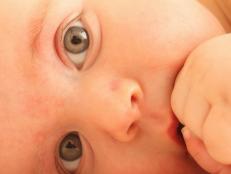White Noise Machines May Be Dangerous for Infants, Study Says
Is it time to turn off the white noise machine in your baby’s nursery?


Image Source
When you're trying to get your baby to sleep and stay asleep, you'll try just about anything. From swaddles to lullabies, you might have already made a white noise machine part of your baby's bedtime routine. These popular registry items have become a go-to for many parents, with their calming hums, static sounds, or ocean waves seeming to work wonders. By drowning out household noise, they help babies fall asleep faster and stay asleep longer. But recent research is raising questions about whether these machines expose babies to sound levels that could impact their development.
How Loud Is Too Loud?
According to the latest research, many white noise machines exceed the sound levels recommended by the National Institute for Occupational Safety and Health (NIOSH). For adults, NIOSH recommends a maximum exposure of 85 decibels for eight hours. But some white noise machines hit levels as high as 91 decibels — about the same noise level as a lawnmower. That’s definitely not the soothing environment you’re going for at bedtime.
While most parents aren’t blasting white noise machines at maximum volume, the study shows that even at lower levels, prolonged exposure can lead to problems. The highest settings could cause permanent hearing loss if used consistently throughout the night, and even moderate levels might damage a baby’s sensitive ears over time.
The Impact of Noise on Baby’s Hearing
So, what exactly happens when a baby is exposed to high levels of noise? Extended exposure to loud sounds can damage the tiny sensory hair cells in the ear that send sound signals to the brain. Loud noise can also affect the nerve endings and support structures inside the ear. Over time, this damage can lead to inflammation, breakage of surface receptor proteins, and even the death of essential cells. Once those cells are damaged, they don’t regenerate, which could lead to long-term hearing issues.
But it’s not just hearing that’s at risk. Studies have shown that children exposed to high levels of noise over time are more likely to experience behavioral issues, sleep disturbances, and delays in language development. There’s even evidence suggesting that consistent exposure to loud noise could impact brain areas responsible for language and reading skills.
White Noise Isn’t All Bad
At this point, you might be thinking about tossing your white noise machine. But before you do, it’s important to note that white noise itself isn’t the bad guy here. Plenty of research shows that white noise, when used correctly, can help babies and even adults sleep better. The key is to keep the volume at a safe level.
NIOSH recommends that white noise machines should be kept at or below 60 decibels — about the volume of a quiet conversation. A good rule of thumb: if you can talk over the sound without raising your voice, it’s probably safe. At this level, white noise can still mask disruptive sounds and create a peaceful sleep environment, but without putting your baby’s hearing at risk.
How To Check Your White Noise Machine’s Volume
If you’re unsure whether your white noise machine is within the safe range, don’t worry — there’s an easy way to find out. The NIOSH has a free app called the Sound Level Meter (SLM), which turns your phone into a decibel meter. With just a few taps, you can measure the noise levels in your baby’s room and make sure the white noise machine is operating within a safe range.
It’s also a good idea to place the white noise machine as far from your baby’s crib as possible. Experts suggest placing it at least 7 feet away to further reduce the risk of overexposure to noise.
YOU MIGHT ALSO LIKE:















